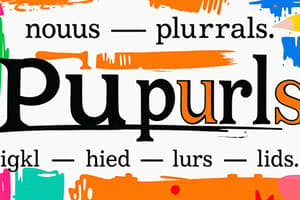Podcast
Questions and Answers
Which suffix is commonly used to derive nouns from adjectives indicating a property of being?
Which suffix is commonly used to derive nouns from adjectives indicating a property of being?
- -ment
- -tion
- -ness (correct)
- -er
What is an example of a noun derived from a verb using a common suffix?
What is an example of a noun derived from a verb using a common suffix?
- radicalism
- engagement (correct)
- happiness
- teacher
Which suffix is NOT typically used to derive nouns from adjectives?
Which suffix is NOT typically used to derive nouns from adjectives?
- -ly (correct)
- -ness
- -ity
- -ism
Which strategy can be used to derive nouns from other forms besides affixation?
Which strategy can be used to derive nouns from other forms besides affixation?
What prefix is commonly used to indicate a contrasting meaning?
What prefix is commonly used to indicate a contrasting meaning?
Flashcards
Nouns from Adjectives
Nouns from Adjectives
Nouns formed from adjectives often use suffixes like -ity, -ness, or -ism. For example, 'equality' from 'equal', 'goodness' from 'good', and 'radicalism' from 'radical'.
Nouns from Verbs
Nouns from Verbs
Nouns derived from verbs often utilize suffixes like -ance, -ence, -ment, -ing, -ation, -al, or -er. For example, 'performance' from 'perform', 'engagement' from 'engage', or 'writer' from 'write'.
Noun Formation: Stress Shift
Noun Formation: Stress Shift
Changing the stress pattern in a word can create a noun from a verb. For example, 'object' (verb) becomes 'object' (noun) with a shift in emphasis.
Adjectives from Adjectives
Adjectives from Adjectives
Signup and view all the flashcards
Adjective Suffix: -ish
Adjective Suffix: -ish
Signup and view all the flashcards
Study Notes
Noun Derivation
- Common methods for deriving nouns from other word classes (adjectives and verbs) often use suffixes.
- Three common suffixes for deriving nouns from adjectives are:
- ity (e.g., equality)
- ness (e.g., goodness)
- ism (e.g., radicalism)
- These suffixes signify the quality or state of being described by the adjective.
- Nouns can also be derived from the base form of an adjective, not necessarily the adjective ending in -ous. For example, "ferocity" comes from "feroc," not "ferocious."
- The ity suffix often works with adjectives ending in ious (e.g., capacity from capacious).
- Some nouns derive directly from adjectives (e.g., deliciousness from delicious).
Verb-Derived Nouns
- Six common suffixes for deriving nouns from verbs are:
- ance/-ence (e.g., performance, reference)
- ment (e.g., engagement)
- ing (e.g., singing)
- ation/-ion (e.g., organization, confusion)
- al (e.g., arrival, referral)
- er (e.g., writer)
- Derivation is not limited to affixation (suffixes and prefixes).
- Other methods include:
- Changing stress position (e.g., object/judgement)
- Altering final consonants (e.g., prove/proof, believe/belief)
- Changing vowels (e.g., song/sing, seat/sit)
- Other languages also use these derivational strategies.
Adjective Derivation
- Adjective derivation primarily utilizes prefixes.
- The only common suffix is -ish meaning "somewhat" or "somewhat like" (e.g., greenish, smallish).
- The prefix un- commonly signifies a contrasting opposite (e.g., unhappy, unrelated).
- The prefix in- often signifies negativity or a lack of a quality (e.g., inexpensive, impossible).
Studying That Suits You
Use AI to generate personalized quizzes and flashcards to suit your learning preferences.




